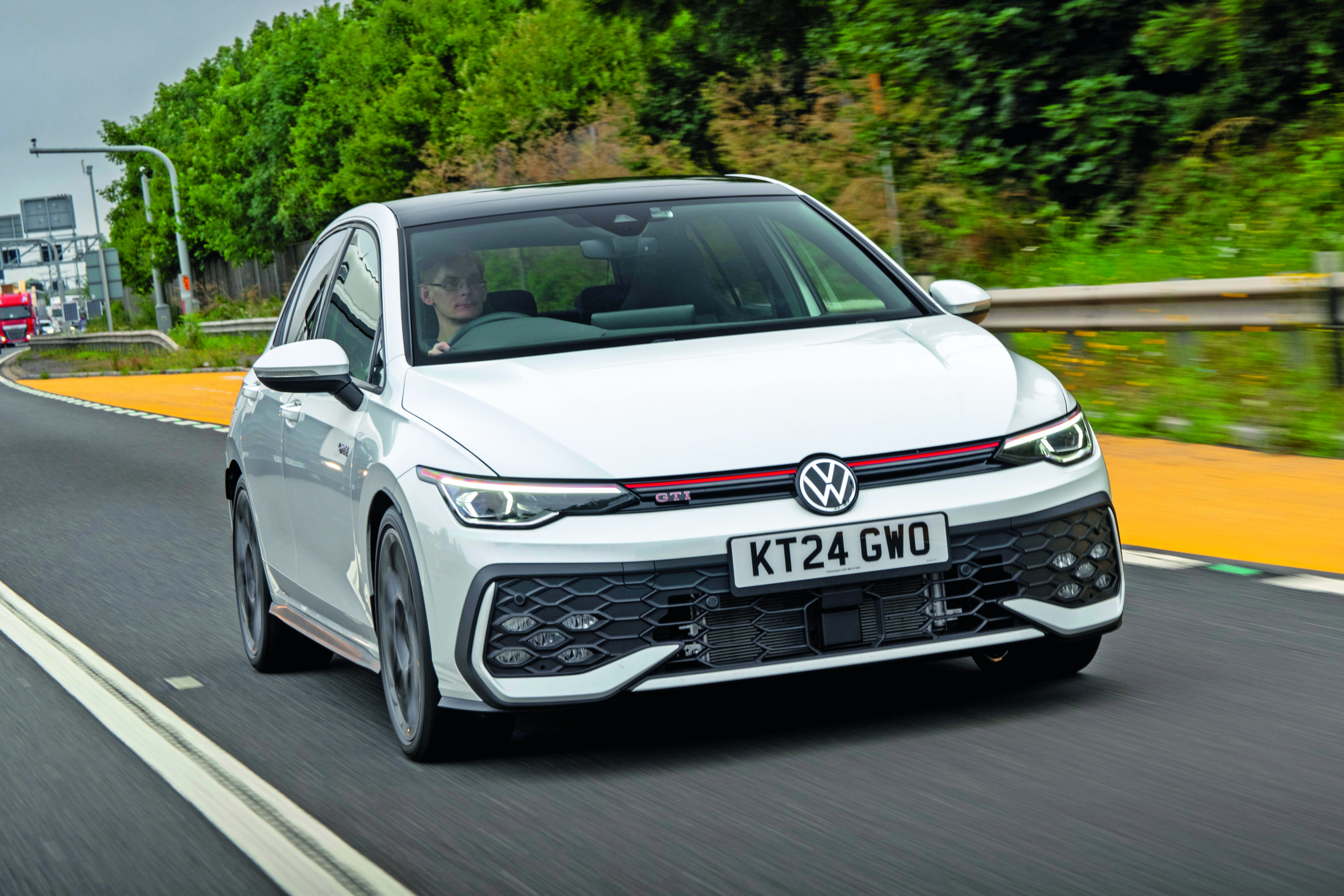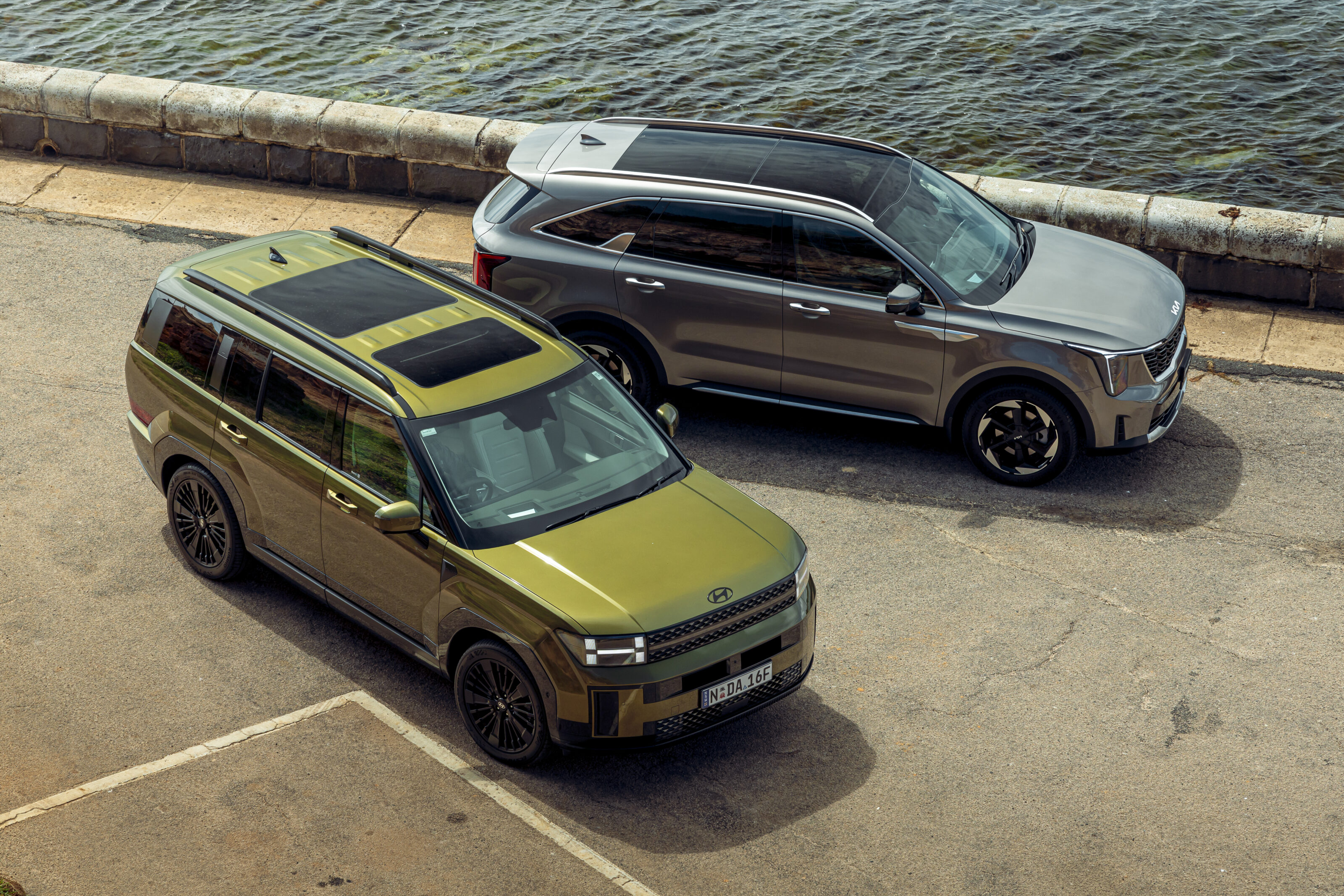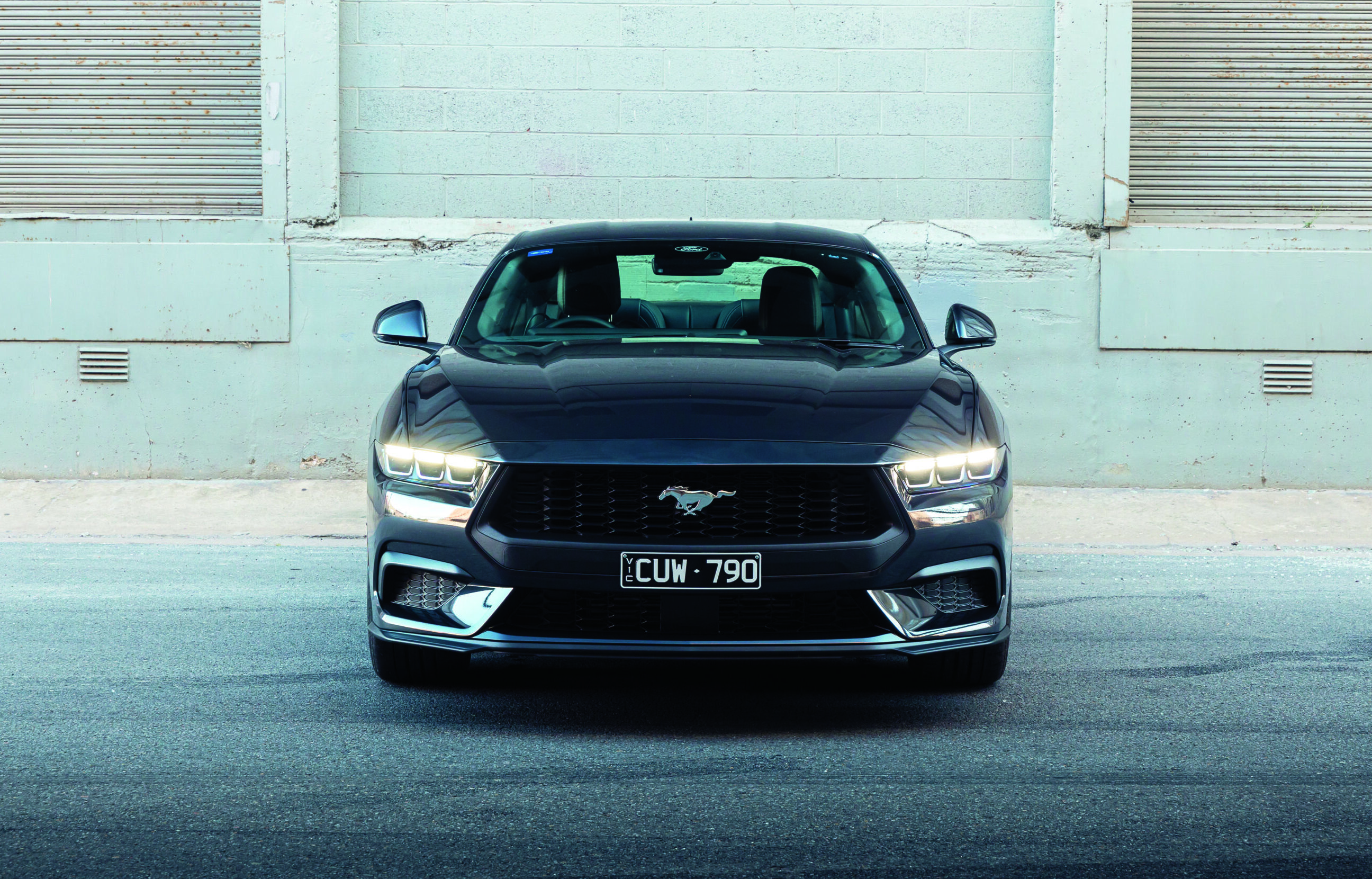
Things we like
- Increased space for second and third rows
- Spoilt-for-choice storage including clever bilateral console cubby
- Curtain airbags now fully cover third row
- General refinement
Not so much
- Significant weight gains could decrease fuel efficiency
- Hybrid’s doughy throttle response in Eco mode
- Price increases inevitable and no entry model at launch
The Santa Fe is one of only two enduring, continuous nameplates since Hyundai made things official locally in 2003 with an Australian subsidiary.
(In case you haven’t guessed, the other is Sonata; while Tucson still exists, it was interrupted between 2010 and 2015 by the ix35.)
Looking like a big SUV that’s just escaped from Minecraft into the real world, the rectangular, fifth-generation Santa Fe is the latest Hyundai to demonstrate just how far the Korean brand’s confidence has come in a couple of decades.
JUMP AHEAD
- How big is big?
- Boot space comparison table
- Interior space and comfort
- Premium feel
- How does it drive?
- Hybrid only!
- Powertrain comparison table
- How much will the new Santa Fe cost?
- VERDICT
- Specifications
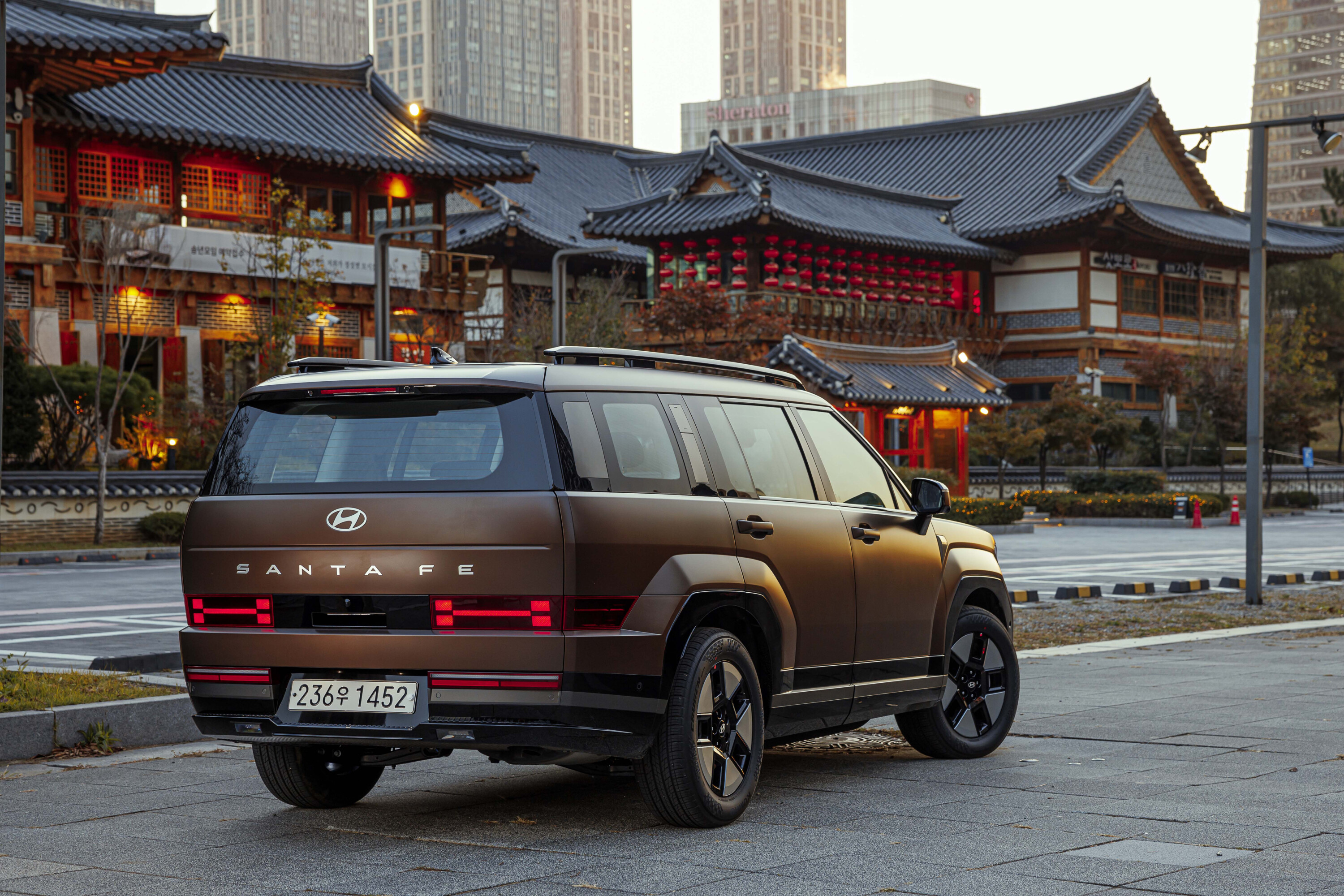
How big is big?
It’s not only bolder looking, but bigger.
The fifth-gen Santa Fe is 4.5cm longer than the outgoing model (which is still selling strongly), including a 5cm stretch to the wheelbase, and height is up by 3.5cm.
It brings more interior space to a large SUV that Hyundai says is better equipped than ever before for transporting families around the suburbs and into the great outdoors. There’s extra practicality before even jumping inside, however.
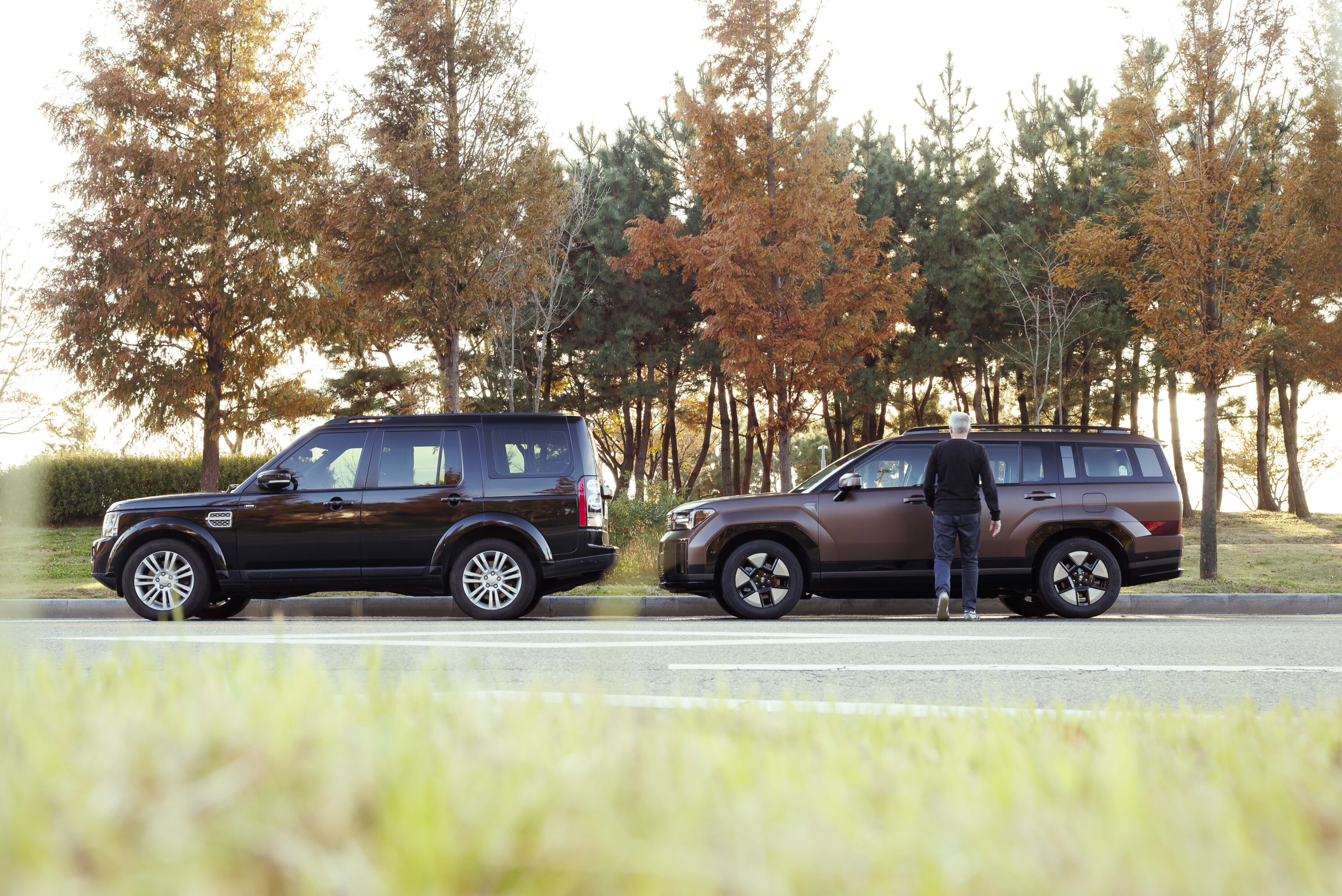
To the side of the rear doors, a small panel can be pushed inwards to create a handle to lift yourself up onto the rear tyre to better access the roof rails or roof stowage.
At the rear, although vehicle width is unchanged from before, the tailgate has – through cleverly packaged, upright struts – been widened by 12.5cm for significantly improved boot access. Boot space increases by a useful 91 litres with the third-row seats down.
The latest Santa Fe, now 4.83m long, doesn’t look as large in the metal as it may in pictures, but the Land Rover Defender inspiration feels just as strong. (Make that borderline copycat if you consider the Santa Fe XRT concept unveiled in August.)
Mini matchup: Boot space
| 2024 Santa Fe | 2023 Santa Fe | Mazda CX-8 | Nissan Pathfinder | Hyundai Palisade | Toyota Kluger | Kia Sorento | Toyota Prado | Skoda Kodiaq | |
|---|---|---|---|---|---|---|---|---|---|
| Dimensions [L / W / H / WB) | 4830 / 1900 / 1720mm / 2815mm | 4785 / 1900 / 1685 / 2765mm | 4925 / 1845 / 1725 / 2930mm | 5004/1978/1802/2900mm | 4995 / 1975 / 1750 / 2900mm | 4966 / 1930 / 1755 / 2850mm | 4810 / 1900 / 1700 / 2815mm | 4995 / 1885 / 1890 / 2790mm | 4697 / 1882 / 1681 / 2790mm |
| Boot u2013u00a02nd & 3rd folded | 1148 litres | 782 litres | Not provided | 782 litres | Not provided | 1150 litres | 2011 litres | 1833 litres | 2005 litres |
| Boot u2013u00a03rd folded | 662 litres | 571 litres | 775 litres | 554 litres | 704 litres | 552 litres | 616 litres | 620 litres | 765 litres |
| Boot u2013u00a0all seats upright | TBA | 130 litres | 209 litres | 205 litres | 311 litres | 241 litres | 187 litres | 120 litres | 270 litres |
| Second-row split-fold | 60/40 | 60/40 | 60/40 | 60/40 | 60/40 | 60/40 | 60/40 | 40/20/40 | 40/20/40 |
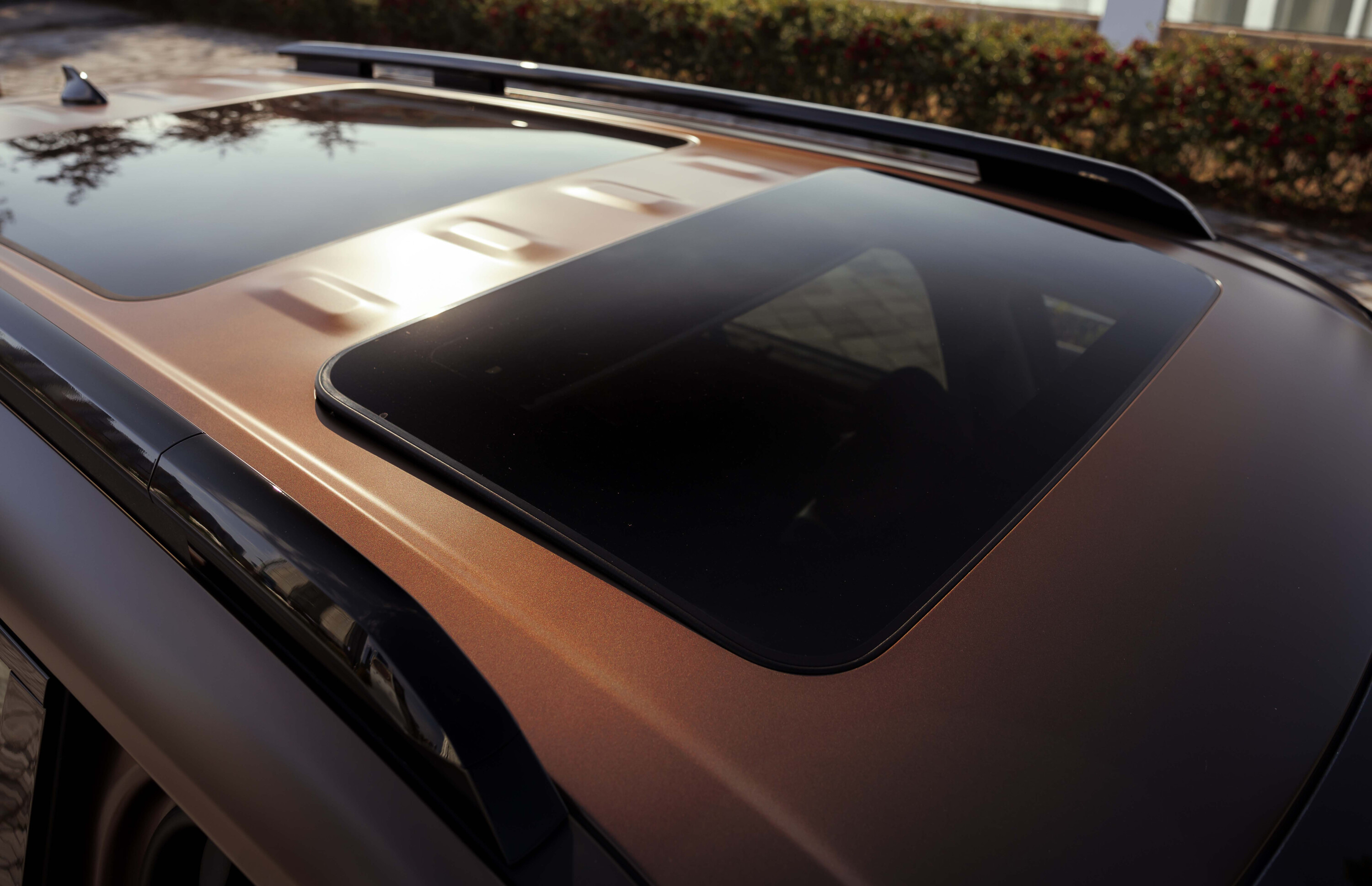
There’s plenty of original thought, however, to Hyundai’s second-largest SUV after the Palisade – not least the H-pattern LED headlights and tail-lights.
Our test car for a few days in Korea is finished in a new bronzy metallic hero colour called Earthy Brass. It’s a top-spec model that may retain the Highlander badge in Australia but could follow the Palisade’s switch to Calligraphy for its flagship nomenclature.
The powertrain is a hybrid that will return to Australia, though our market will take it in all-wheel-drive ‘H-trac’ form rather than the front-drive set-up currently offered and found on our tester.
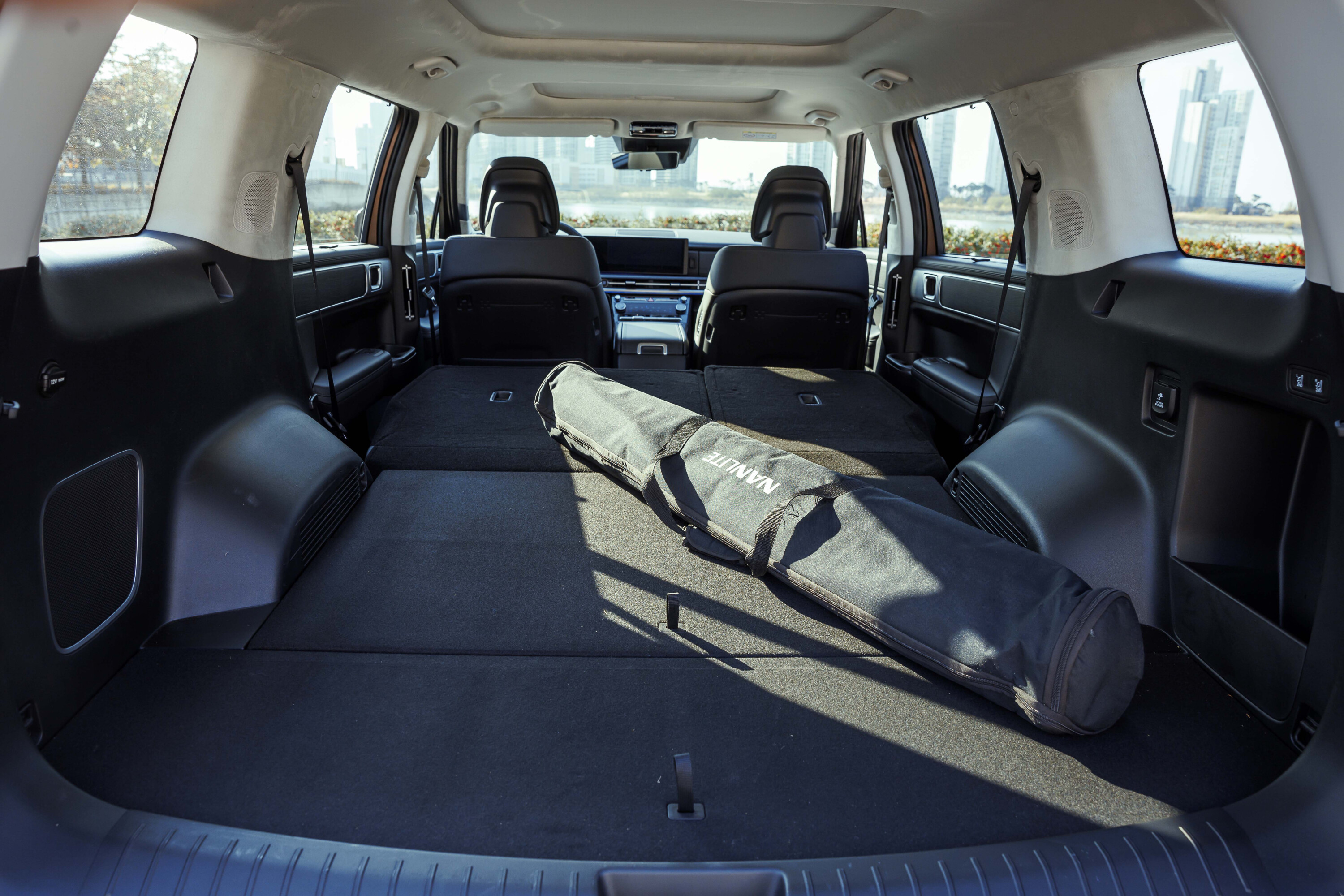
Seven seats for Australia & more space
Another key element missing from our Korean example: it’s a five-seater only, where all Australian Santa Fe models will continue as seven-seaters.
That rules out assessing a claimed improvement to third-row space, an area where the Santa Fe certainly trailed the rival Toyota Kluger.
Hyundai says 2024 Santa Fe legroom has increased by 1.5cm, while benchmark headroom is claimed through a 6.9cm increase – helped by that taller roofline as seating height has increased by 3cm. There’s a little extra shoulder room, too, we’re told.
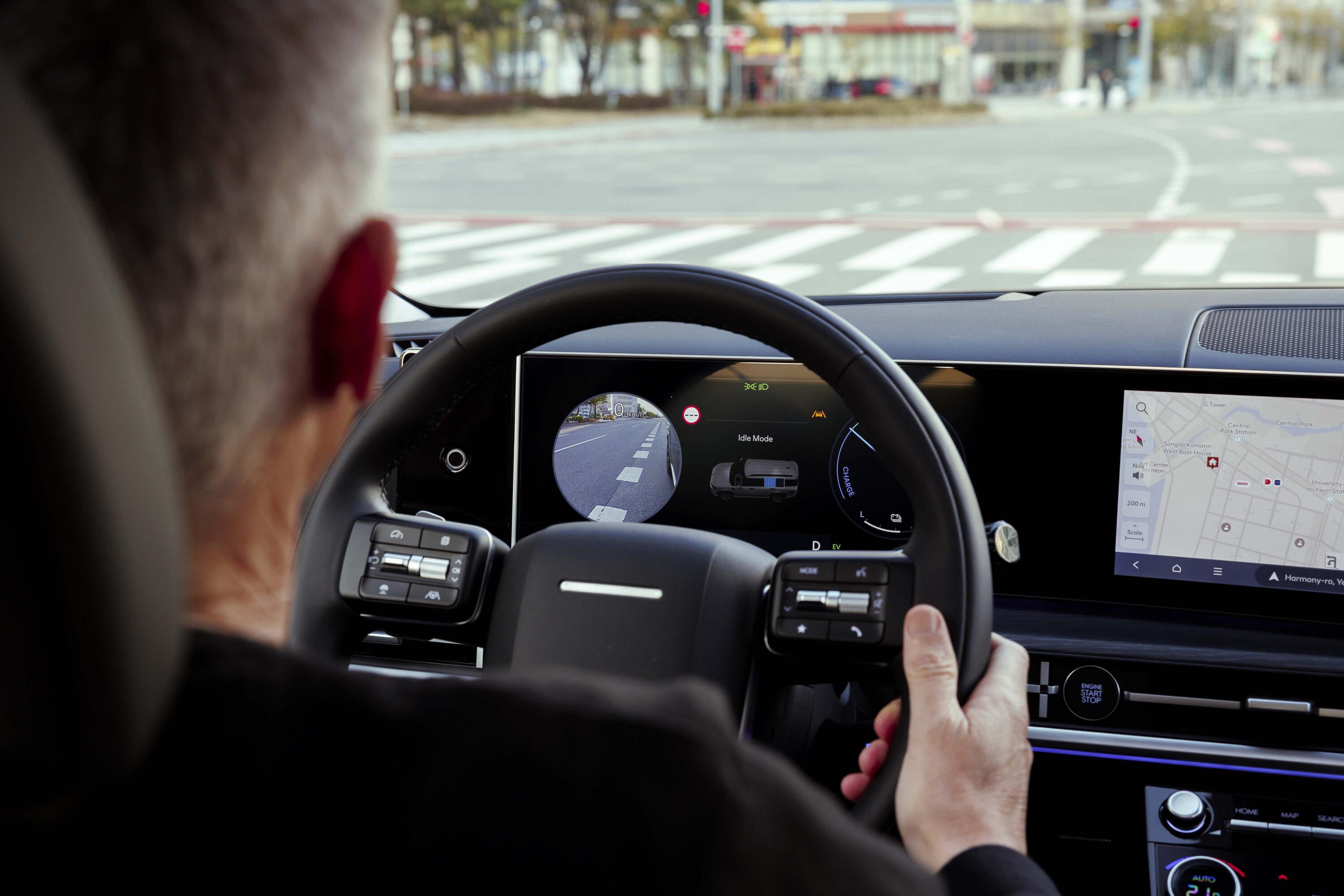
The rear doors open wide for convenient ingress/egress, and there’s increased legroom – 2cm for the petrol-electric Hybrid and 3.5cm for petrol-only models.
A sliding 60-40 bench enables tailoring of legroom/boot space.
There’s decent headroom even with the dual-pane sunroof of our ‘Highlander’ spec, the floor is almost flat in the middle to help comfort for middle-seat occupants, the bench’s under-thigh support bodes well for long-distance comfort, and the seatbacks recline.
Each seatback incorporates coat hooks, elasticated map flap, and USB-C port. Two cup holders are integrated into the rear doors, above a large bottle pocket, in addition to the two available when lowering the centre armrest.
B-pillar vents deliver cool/warm air, while manual window blinds are another ‘Highlander’ feature.
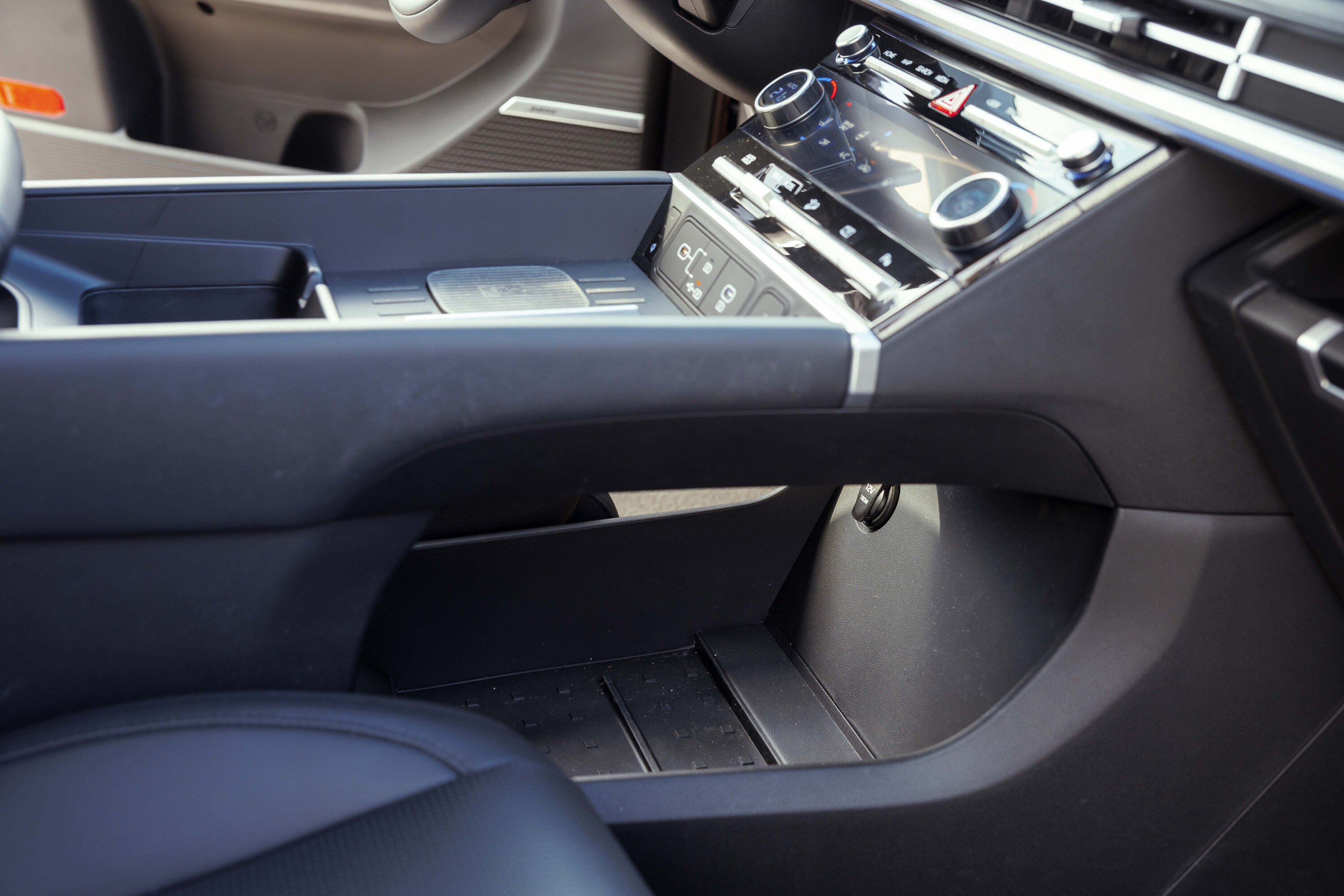
There’s one feature that most obviously highlights Hyundai’s extra consideration of middle-row passengers: a ‘bilateral’ centre console cubby with a lid that opens from the rear as well as the front.
A drawer gives those behind the front row another option for accessing contents in the cubby.
The most distinctive front-cabin feature must be the upper glovebox that doubles as a sterilisation compartment for items such as smartphones or wallets – which, at the touch of a button, bombards them with bacteria-battling UV-C light.
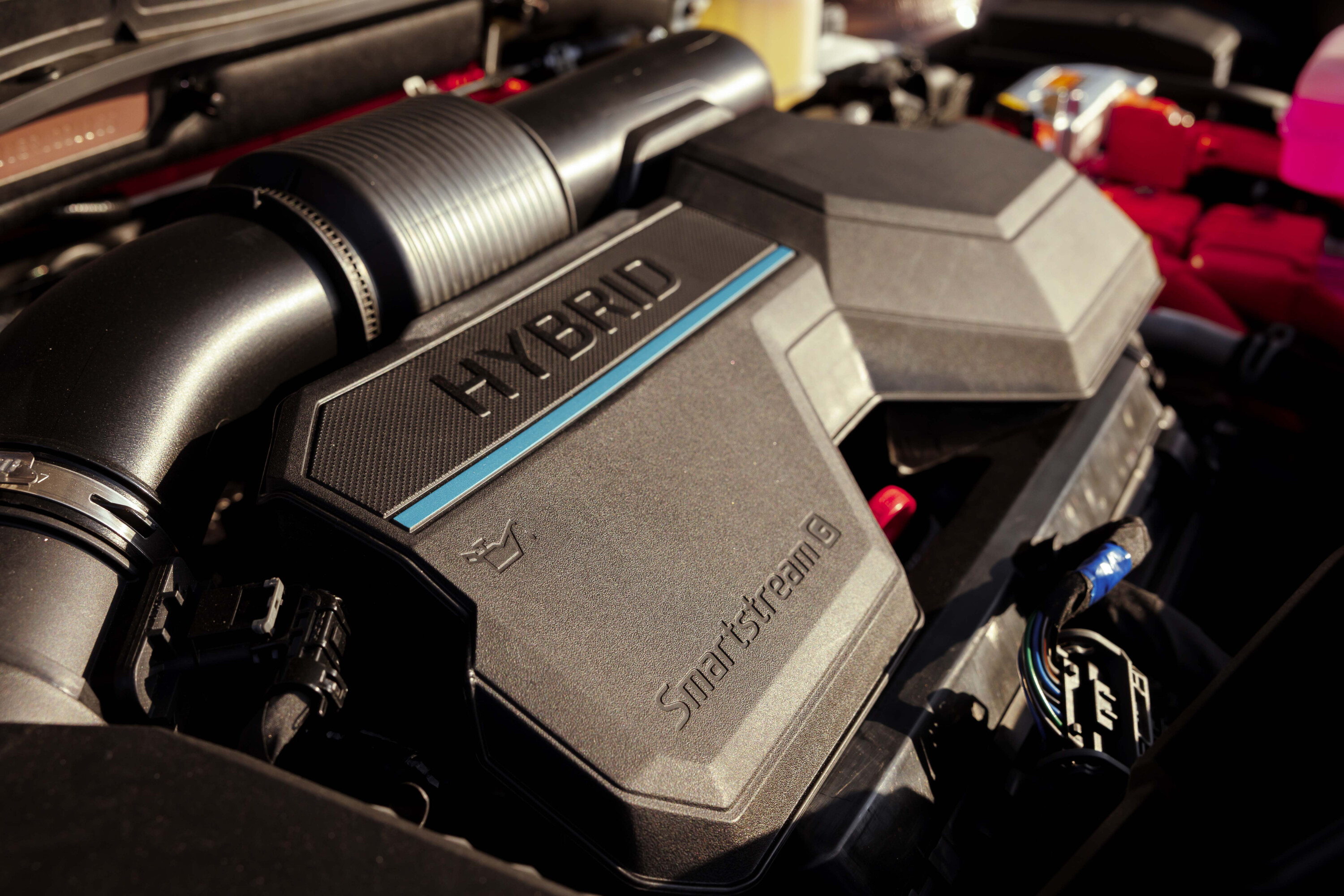
You can then place not just one but two smartphones on the dual charging and germ-eradicating pads in the console.
The flatter and more spacious centre console, with a large storage area beneath, is created by a more steeply raked climate control panel and a change from transmission dash buttons to a shift-by-wire steering wheel stalk.
A completely horizontal dash with a curved (or bent, more accurately) display combining dual 12.3-inch screens – one for instruments, one for infotainment – does the hard yards in giving the Santa Fe a significantly more contemporary interior design.
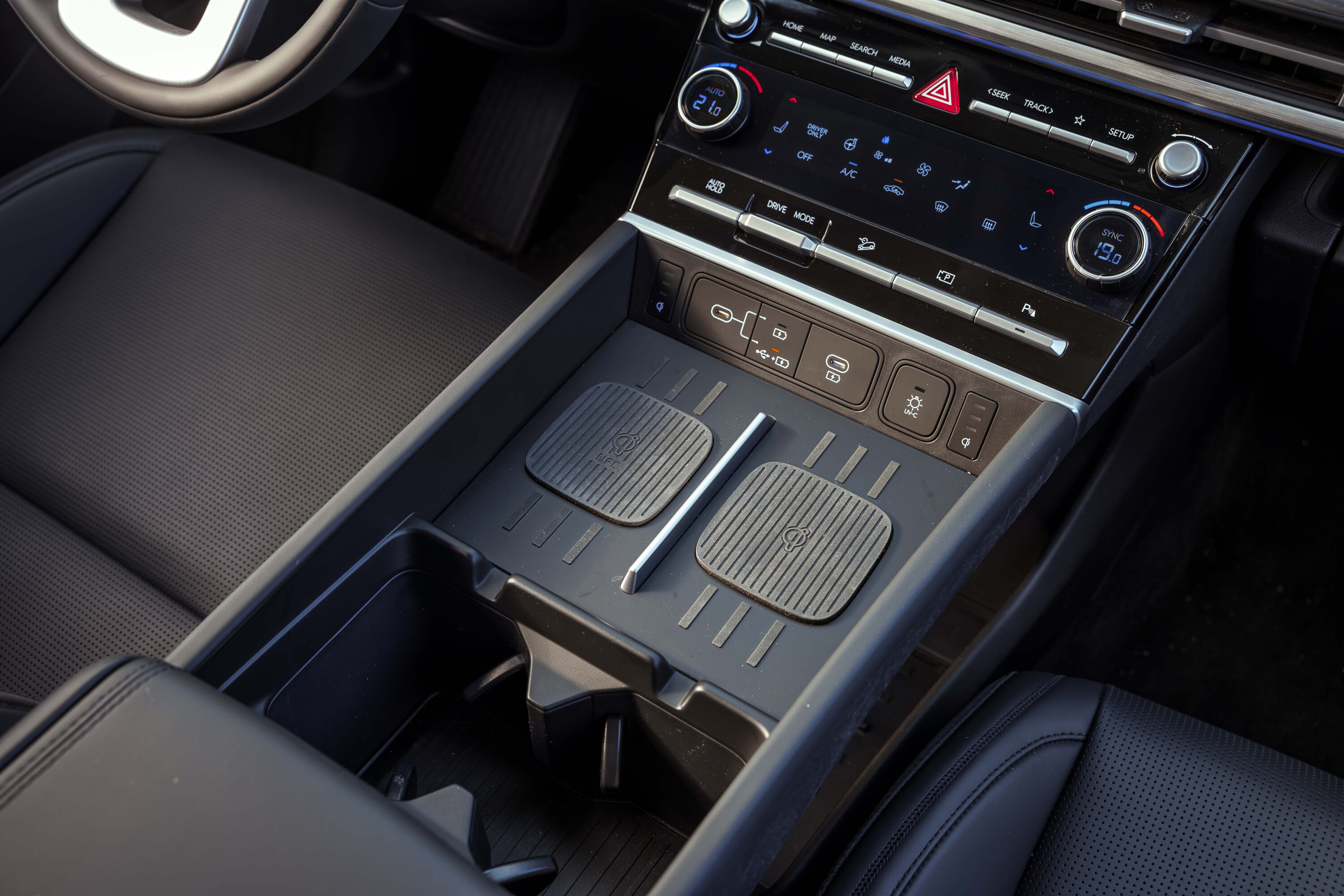
Premium feel
Quality is a step up, too. At least in this high-spec model.
There’s a velvety trim for the pillars and headlining, soft sides for the upper centre console, thin LED strips spread across the dash, and horizontal brushed-metal upper door sections incorporate wood inserts, handles, and buttons for seat memory and (in this spec) massage functions.
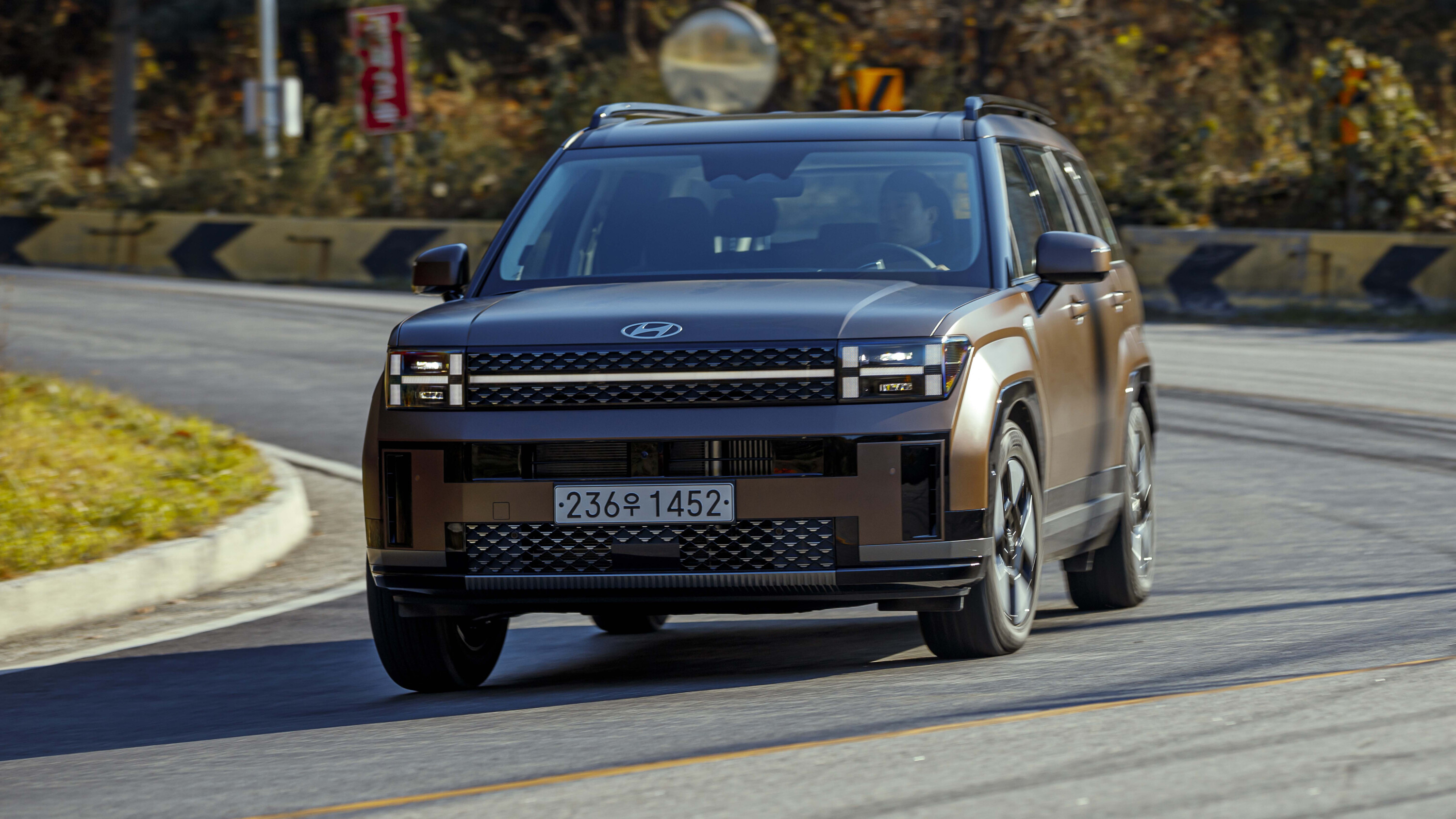
How does the 2024 Hyundai Santa Fe drive?
Having spent a couple of days driving the Santa Fe, including more time than we’d like in horrendously jammed Korean traffic, we can attest to the comfort of the front seats. They also borrow the fully reclining ‘Relaxation seat’ feature first seen in the Ioniq 5.
Ride and handling assessment is trickier as the Australian-market Santa Fe will use a different suspension tune to the Korean-market setup.
The test car also featured relatively small 18-inch wheels, where they could be either 20s or 21s on the local Highlander/Calligraphy.
For what it’s worth, South Korea’s Santa Fe – already on sale with plenty about – generally rides well, getting jiggly only on the poorest of surfaces. We’ll be keeping our fingers crossed that the new hybrid retains the smoothness of the outgoing model.
A revised steering setup seems to have brought some extra accuracy around the straight-ahead position, while the turning circle is also excellent – making this 4.8-metre-long vehicle an absolute doddle to manoeuvre in tighter spaces.
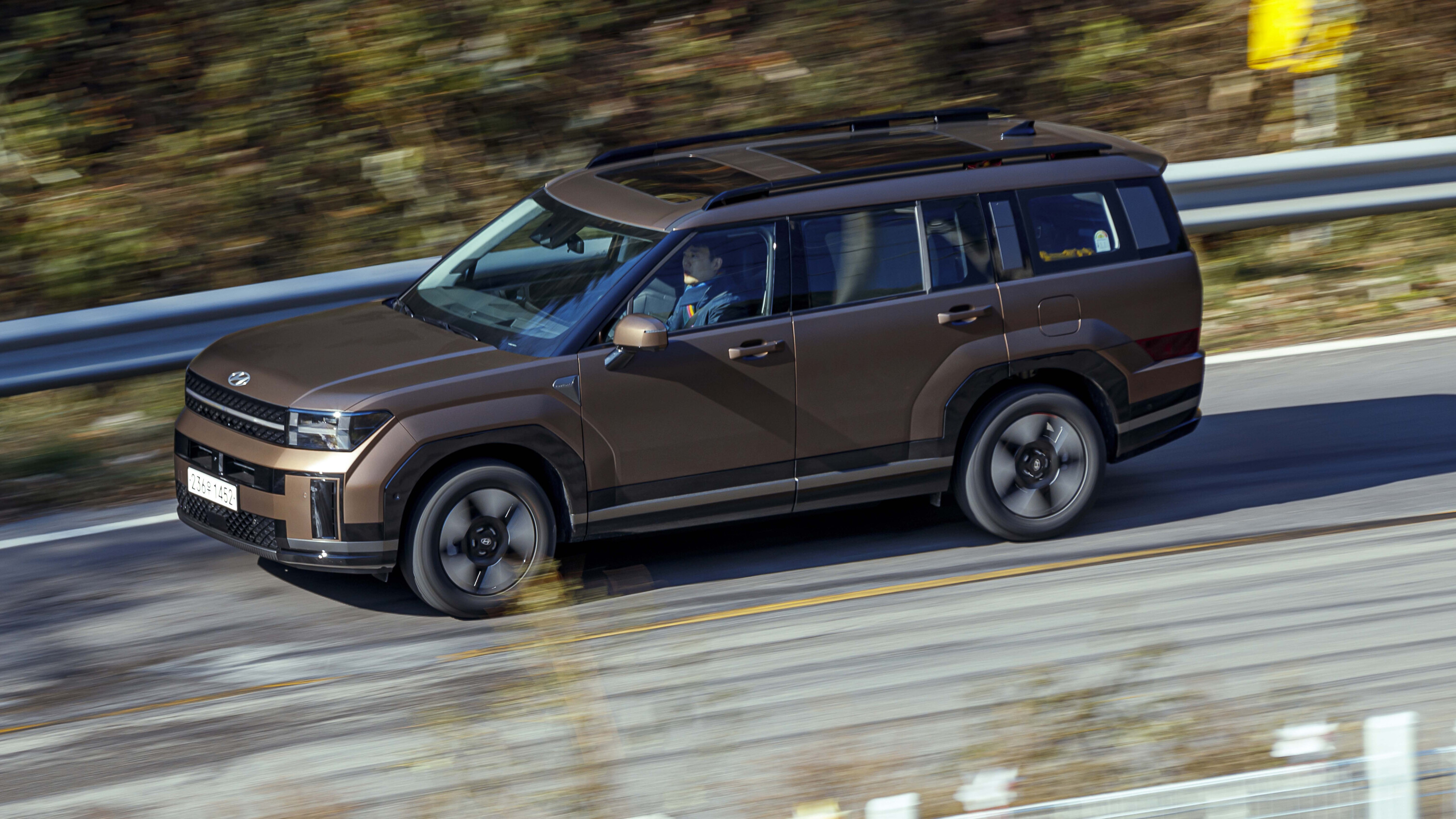
Hybrid only for Australia: No diesel, no V6!
Big news on the powertrains front: the current 2.2L turbo diesel and V6 petrol engines are out.
Our test car was a hybrid variant, which will be the sole drivetrain offering initially for the local launch – again combining Hyundai’s 1.6-litre turbo petrol engine with an electric motor, and again part-time all-wheel drive. Total output is 169kW and 350Nm.
Throttle response is doughy in Eco mode but can be sharpened with Sport mode that keeps the petrol engine permanently running. Sport might be preferable for twistier country roads, otherwise Eco makes sense as the default setting for a hybrid. An Energy Monitor is again available on the driver display to see when the petrol and electric motors are in action, and remains strangely addictive.
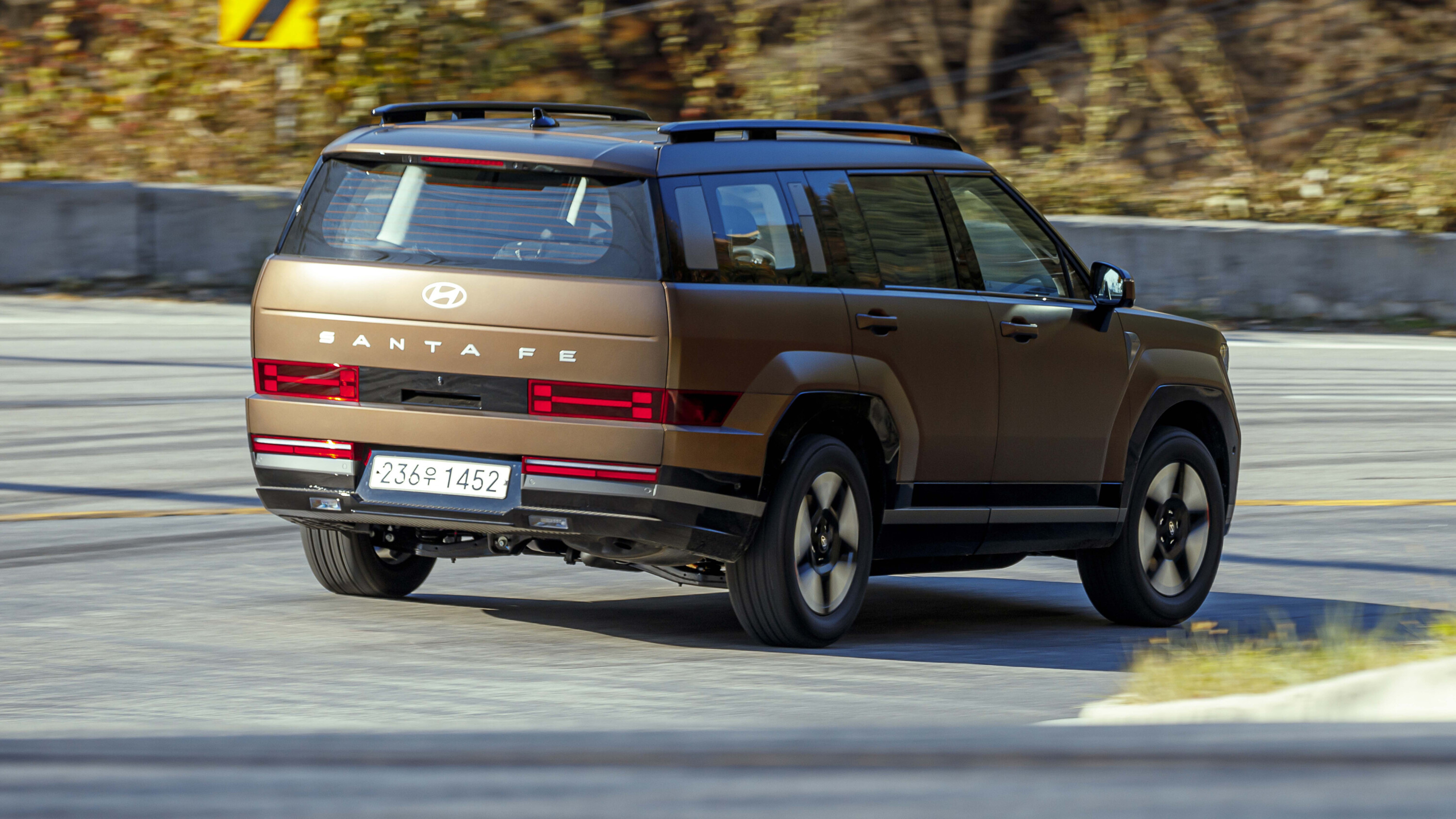
As with a Kluger Hybrid, it’s not difficult to keep the Santa Fe running around town solely on its electric motor only and, when the engine does kick in, it’s quite seamless.
Also promising is something we didn’t notice at all: Hyundai’s Lane Keeping system. This has so far proven at times to be an annoyingly intrusive bit of technology on the latest Hyundais (and Kias) in Australia, so the hope is that the group has finally found a fix for the calibration.
Mini matchup: Powertrains & fuel
| 2024 Santa Fe | 2023 Santa Fe | Mazda CX-8 | Nissan Pathfinder | Hyundai Palisade | Toyota Kluger | Kia Sorento | Toyota Prado | Skoda Kodiaq | |
|---|---|---|---|---|---|---|---|---|---|
| Engine | 1.6L 4cyl turbo petrol + electric motor | 1.6L 4cyl turbo petrol + electric motor | 2.2L 4cyl turbo diesel | 3.5L V6 petrol | 2.2 4cyl turbo diesel | 2.5L 4cyl petrol + electric motors | 2.2 4cyl turbo diesel | 2.7L 4cyl turbo diesel | 2.0L 4cyl turbo petrol |
| Max power | 169kW @ 5500rpm (combined) | 169kW @ 5500rpm (combined) | 140kW @ 4500rpm | 202kW @ 6400rpm | 147kW @ 3800rpm | 184kW (combined) | 148kW @ 3800rpm | 150kW @ 3000-3400rpm | 132kW @ 6000rpm |
| Max torque | 350Nm @ 1000-4500rpm (combined) | 350Nm @ 1000-4500rpm (combined) | 450Nm @ 4000rpm | 340Nm @ 4800rpm | 440Nm @ 1750-2750rpm | N/A (Toyota never tells) | 440Nm @ 1750-2750rpm | 500Nm @ 1600-2800rpm | 320Nm @ 1400-3940rpm |
| Transmission | 6spd auto | 6spd auto | 6spd auto | 9spd auto | 8spd auto | CVT auto | 8spd dual-clutch | 6spd auto | 7spd dual-clutch |
| Weight | 2225kg (hybrid) | 1983kg (hybrid) | 1977kg | 2044kg | 2069kg | 2050kg | 1908kg | 2385kg | 1855kg |
| 0-100km / h | N/A | 8.7sec (claimed) | 9.2sec (claimed) | 8.1sec (estimated) | 9.5sec (claimed) | 8.6sec (est.) | 9.0sec (est.) | Not supplied | 8.4sec (claimed) |
| Economy | N/A | 9.4L / 100km (tested) | 7.9L / 100km (tested) | 14.2L/100km (tested) | 8.6L / 100km (tested) | 5.6L / 100km (claimed) | 7.9L / 100km (tested) | 7.9L/100km (comb) | 8.2L/100km (comb) |
| Price | TBA | $69,550 | $71,410 | $71,490 | $79,900 | $69,990 | $69,990 | $60,830 | $56,490 |
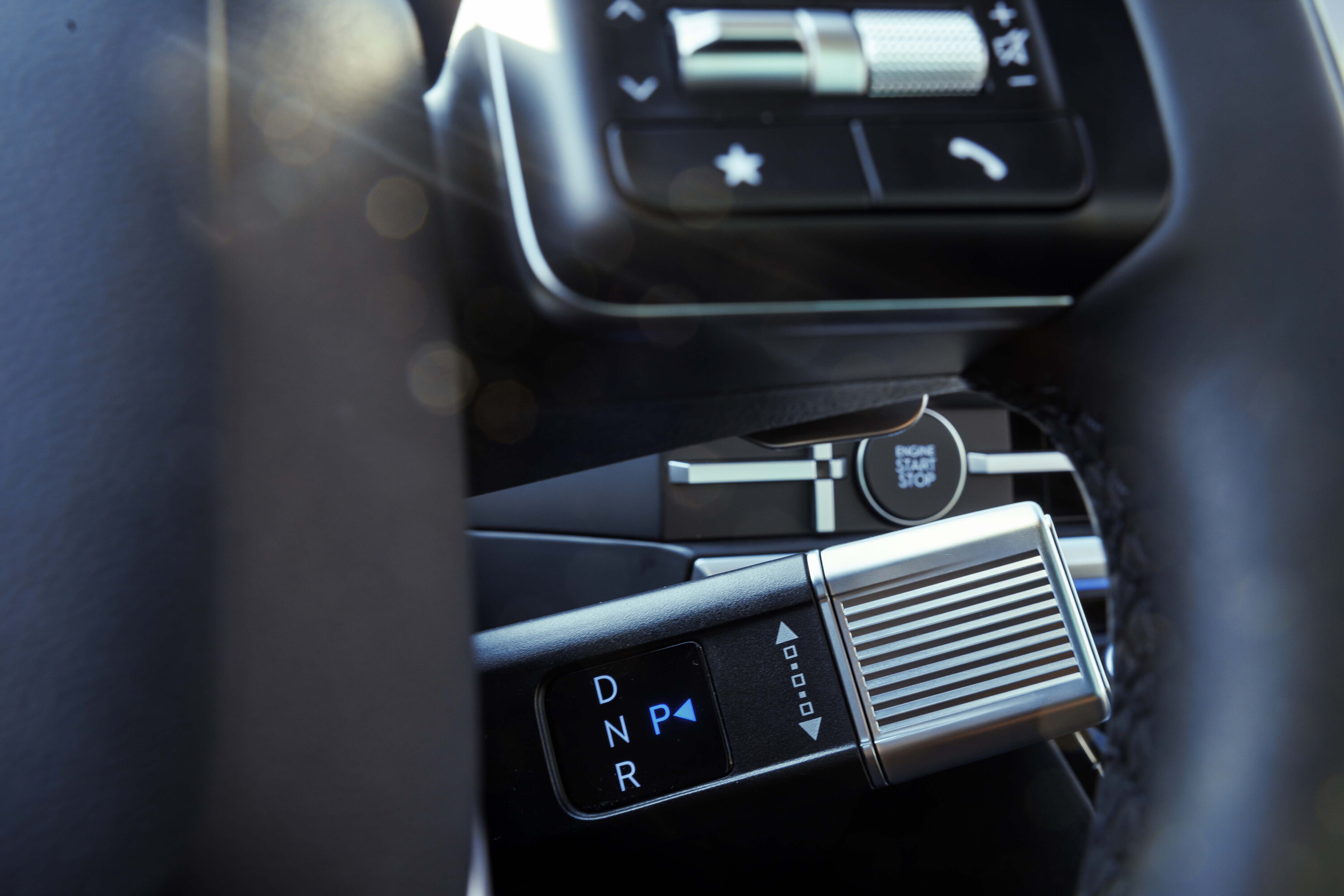
How much will the new 2024 Santa Fe cost in Australia, and what will it come with?
Current price trends are likely to push the Santa Fe Hybrid’s starting point from the existing $63,000 to nearer $70,000.
If so, plenty of Australian families will be hoping for quick confirmation of an entry-level powertrain to sit below the Hybrid. The Santa Fe range currently starts from $46,050 for the 3.5 FWD petrol model and $49,550 for the 2.2L diesel AWD.
The smart money for a more affordable entry model is on a 2.5-litre turbo petrol engine borrowed from the Sonata midsize sedan, already planned to be available in other markets.
Producing healthy outputs of 207kW and 422Nm, it would also, ideally, send power to all four wheels rather than just the front tyres. The auto is an eight-speed dual-clutch auto, where the hybrid utilises a six-speed torque converter automatic.
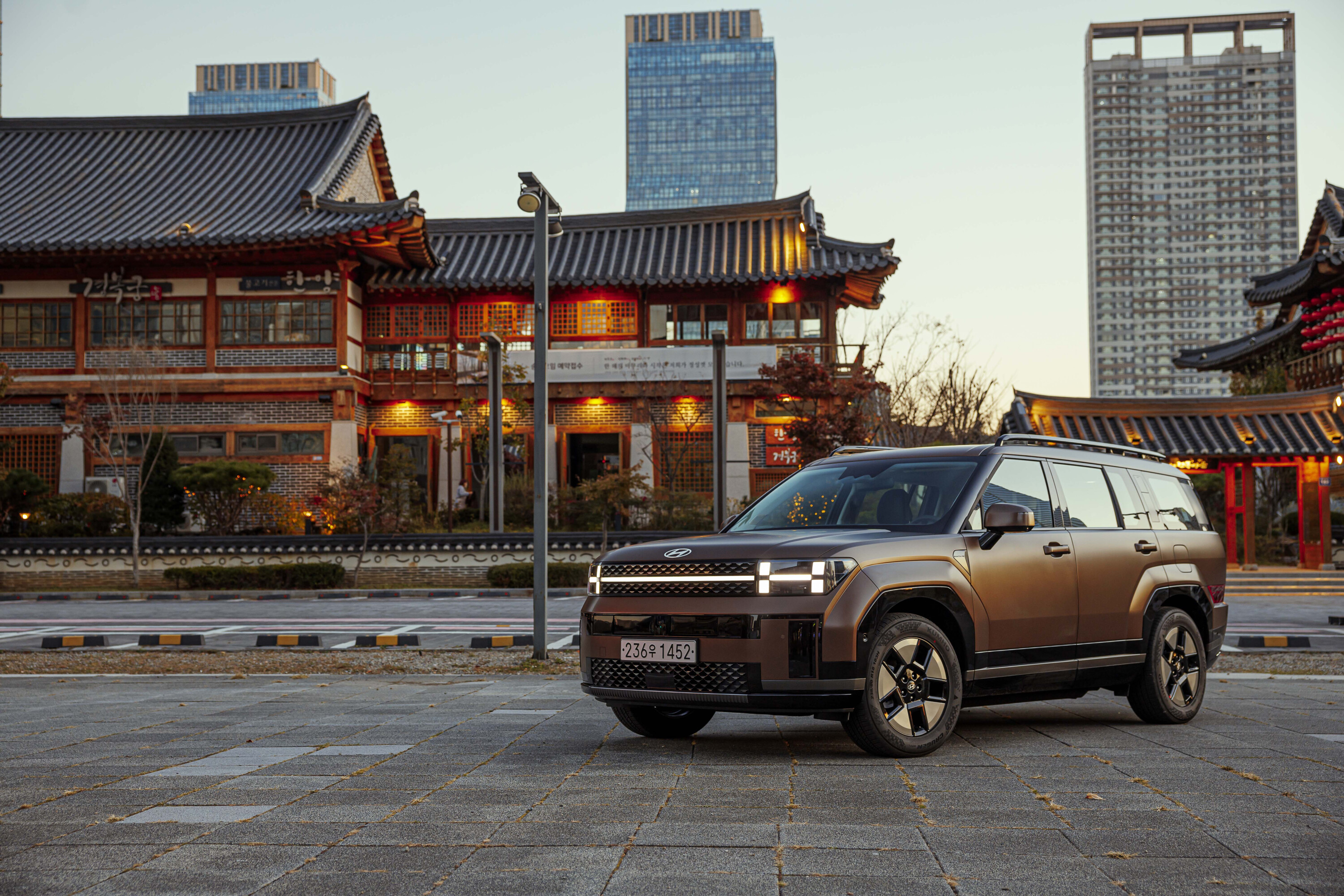
2024 Hyundai Santa fuel economy figures are yet to be confirmed, and they may be one of the areas where the big family SUV doesn’t improve.
The bigger SUV has piled on the pounds – up by about 240kg to 2225kg for the Hybrid. Balancing that, however, are more slippery aerodynamics despite the Santa Fe’s blockier shape. The coefficient of drag is improved from 0.33Cd to 0.29Cd.
VERDICT
This all leaves some important questions hanging for Australia next year: pricing, fuel economy, and third-row experience.
But, even without those points known, the fifth-generation Hyundai Santa Fe undoubtedly feels like a step up over the outgoing model in more than just size.
| 2024 Hyundai Santa Fe hybrid specifications | |
|---|---|
| Body | 4-door, 7 seat wagon |
| Drive | front-wheel drive |
| Engine | 1.6-litre turbo petrol hybrid |
| Transmission | 6-speed automatic |
| Power | 169kW |
| Torque | 350Nm |
| Weight | 2225kg |
| L/W/H | 4830/1900/1720mm |
| Wheelbase | 2815mm |
| Boot space (max) | 1148L |
| Price | TBC |
Things we like
- Increased space for second and third rows
- Spoilt-for-choice storage including clever bilateral console cubby
- Curtain airbags now fully cover third row
- General refinement
Not so much
- Significant weight gains could decrease fuel efficiency
- Hybrid’s doughy throttle response in Eco mode
- Price increases inevitable and no entry model at launch
We recommend
-
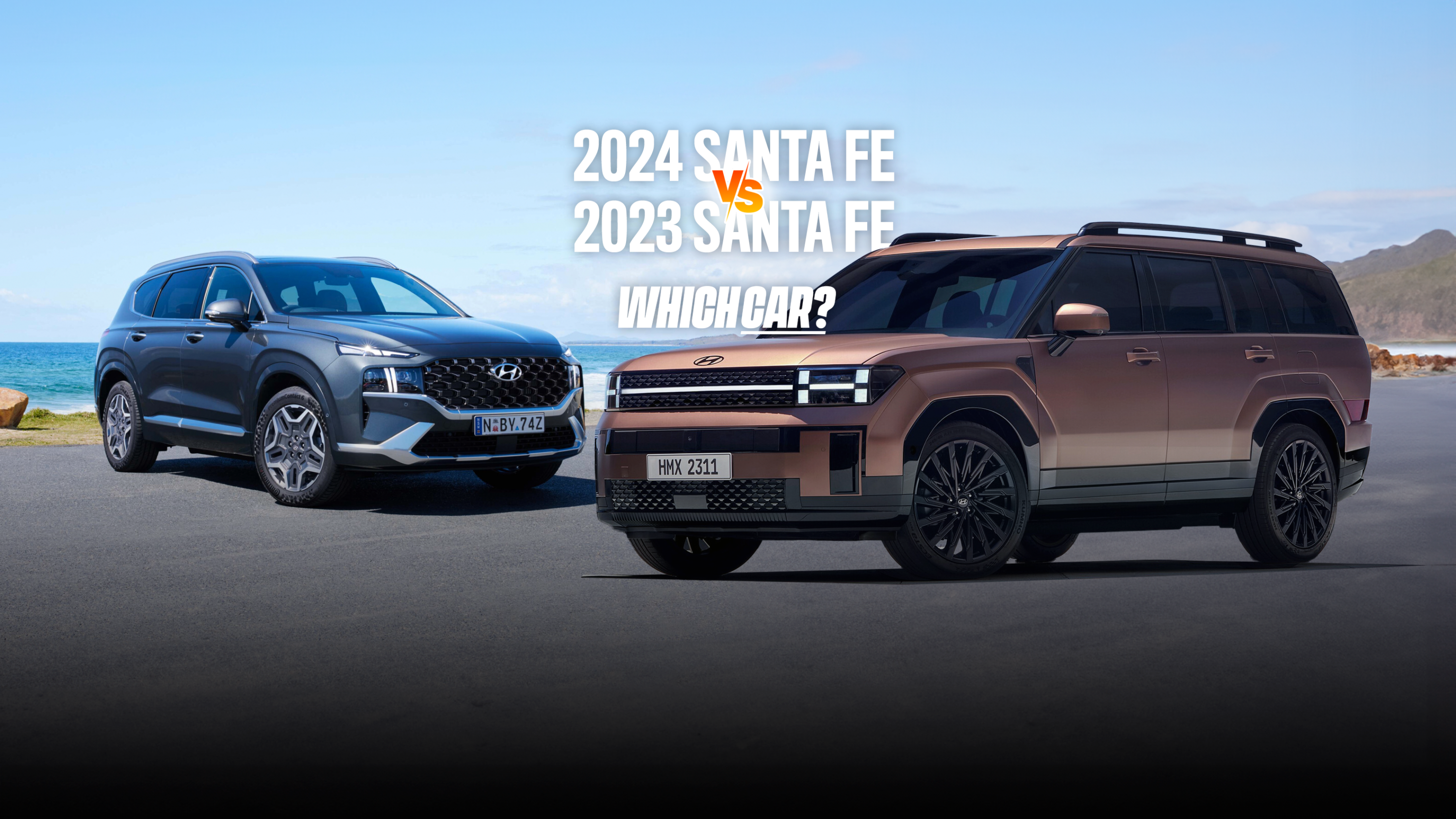 Comparisons
Comparisons2024 Hyundai Santa Fe comparison: Old v New
Considering a 2023 Santa Fe? Maybe you're thinking about the new 2024 model but not sure it’s worth the wait? Let’s take a quick look at the main differences
-
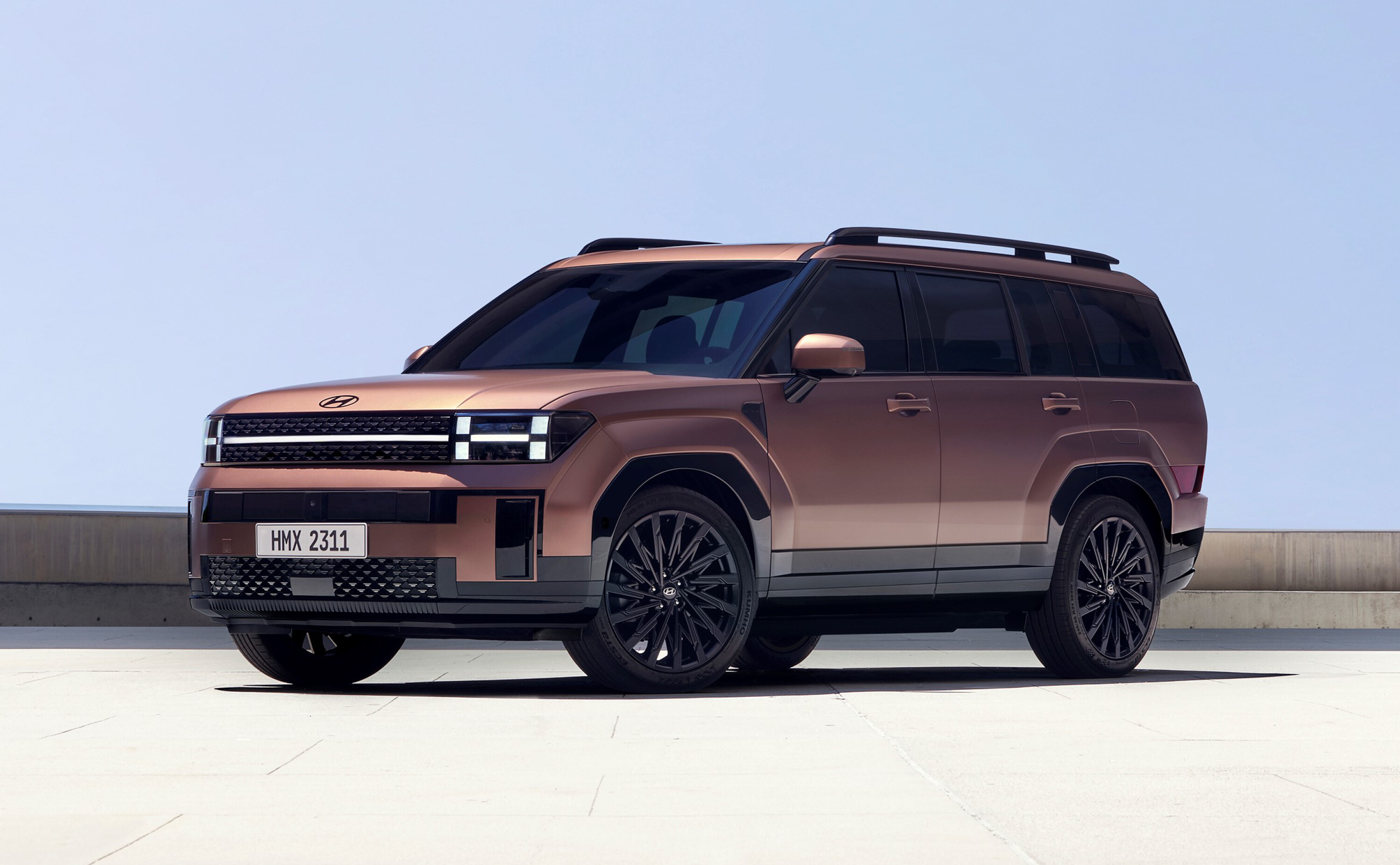 News
News2024 Hyundai Santa Fe revealed, due in Australia next year
The fifth-generation Santa Fe large SUV is a radical departure from its sleeker past, with a squared-off Land Rover-inspired look
-
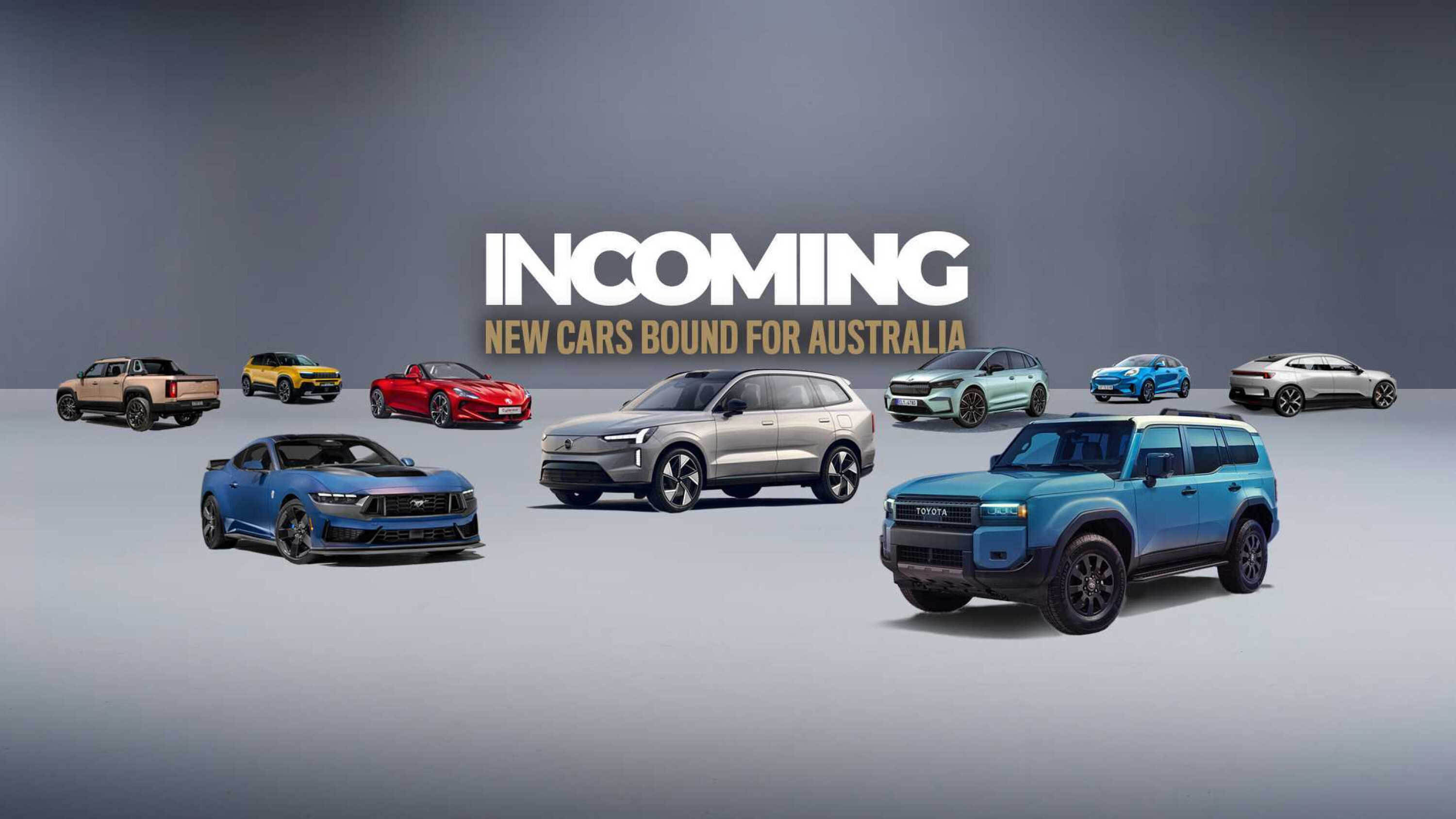 News
News2025 New Car Calendar: All the new cars coming to Australia
Take a look at our list of what is expected to launch in Australia in 2025 – plus those we might not see locally just yet


